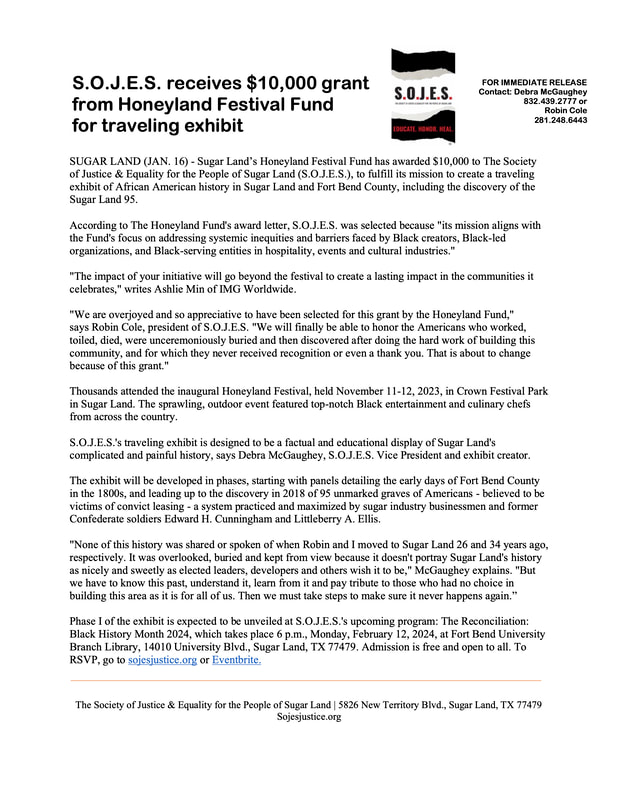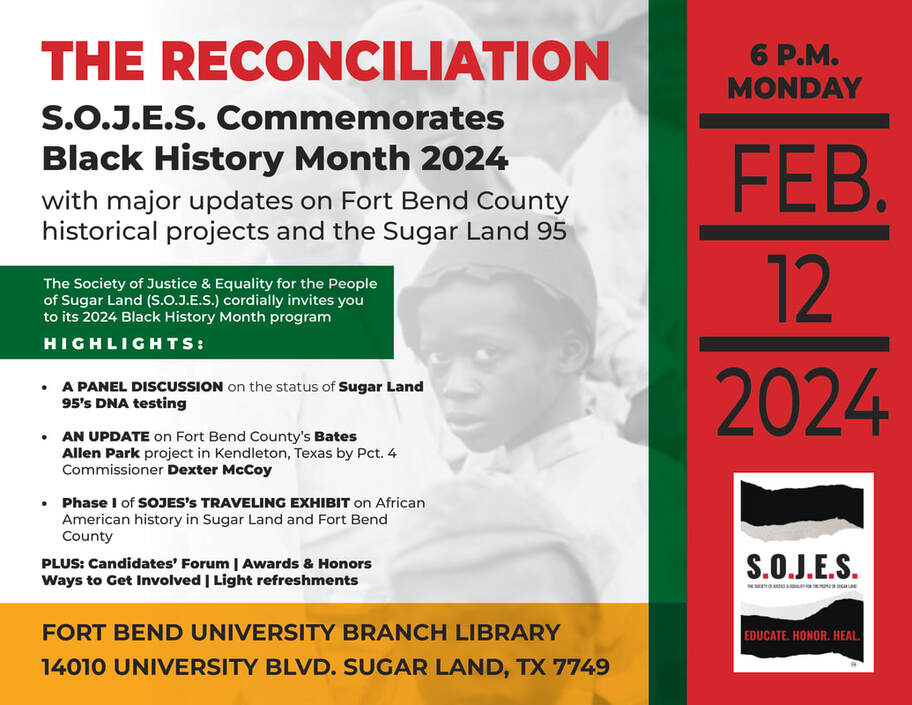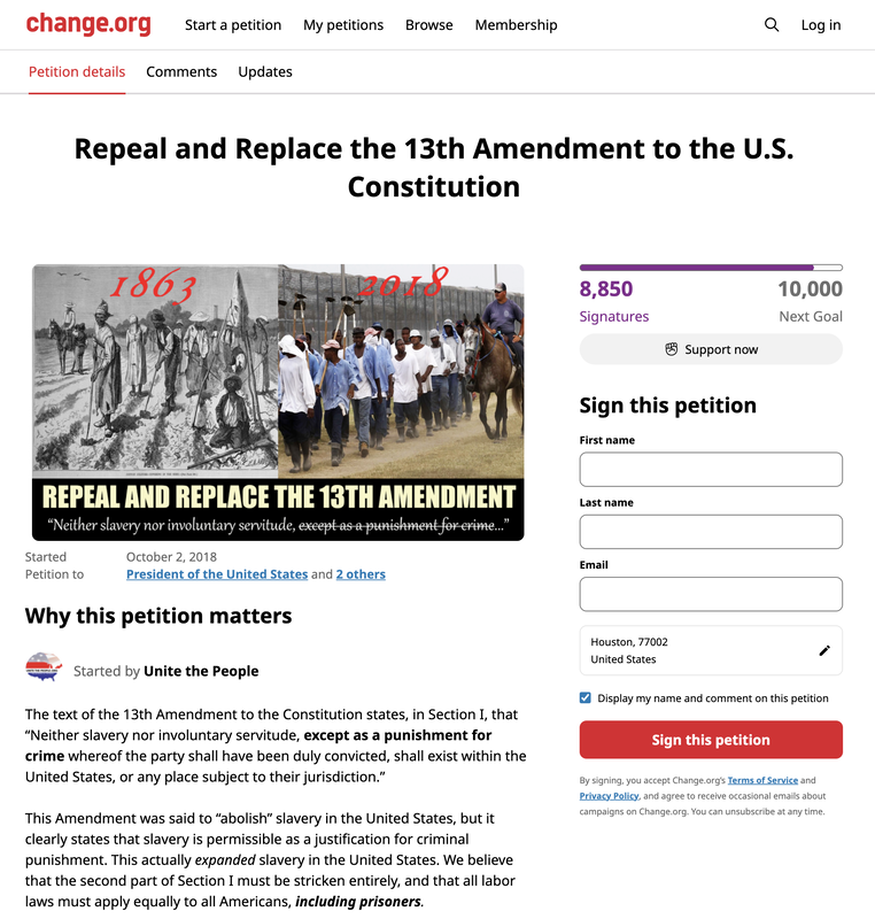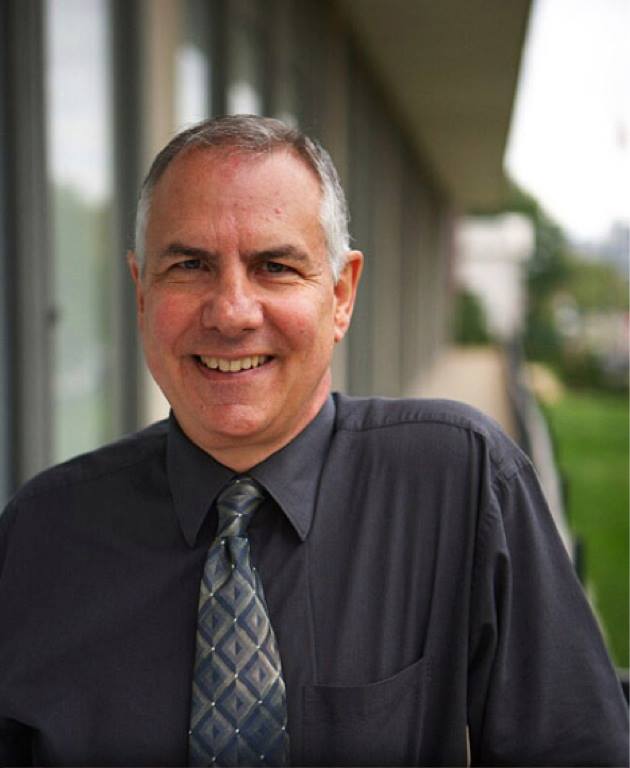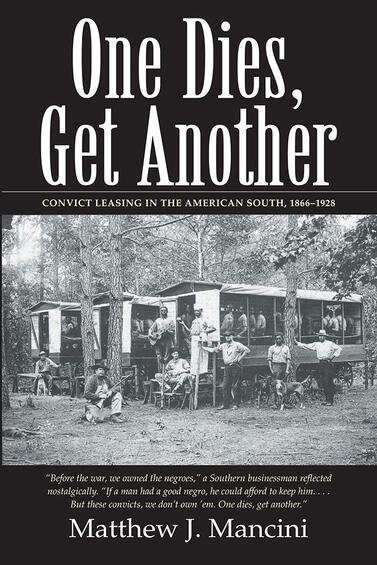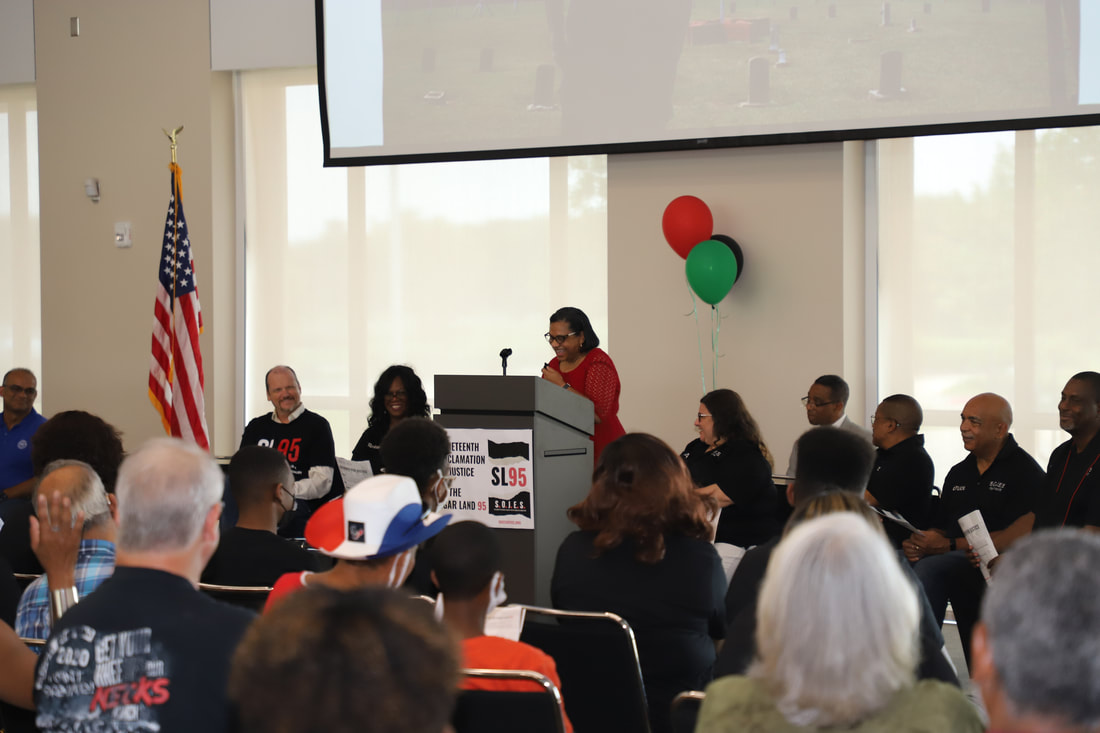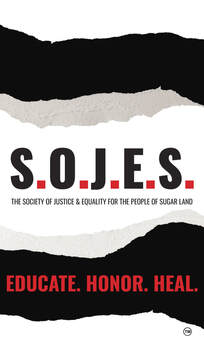The Society of Justice & Equality for the People of Sugar Land
NEWS & EVENTS
S.O.J.E.S. SPEAKS TO RELATIVES
OF THE SUGAR LAND 95
The biggest historical discovery in the United States of unknown convict labor graves finally has a connection to living relatives.
The Society of Justice & Equality for People of Sugar Land (S.O.J.E.S.) - with extraordinary assistance and support from the leaders of the Principal Research Group (PRG) - has conducted Zoom interviews with relatives of two heretofore "unknown" inhabitants of the large gravesite in Sugar Land, Texas.
Goldman Dixon, the great nephew of SL 95's Ben Dixon, has been scientifically traced through DNA, and has allowed S.O.J.E.S. to speak to him.
Ben Dixon's remains are suspected to be in Unknown Grave 54.
Goldman Dixon's grandfather, Leonard Dixon, was the brother of Ben Dixon.
Carolyn Johnican is a relative of Ike Rhodes, whose remains are alleged to be in Unknown Grave 39.
The interviews mark the first time descendants of individuals believed to be buried in the Ellis Camp/Bullhead Camp at the James Reese Career and Technical Center in Sugar Land have spoken about their family ties to the Sugar Land 95.
"We are deeply honored that the relatives of the Sugar Land 95 decided to let S.O.J.E.S. talk to them about their family and their feelings," says Robin Cole, S.O.J.E.S. president.
"For more than six years, the world has viewed these souls only as nameless, faceless victims of the exploitative system of convict leasing. Now, we have real people, real stories and verifiable human connections to this group to make the history of convict leasing in Sugar Land even more tragic, horrific and unbelievable."
In S.O.J.E.S.'s new podcasts - a continuation of its successful Black Sugar: Not So Sweet series - family members Johnny Sue and Yakota Strong (of the Ben Dixon family) discuss in detail:
Who they are and how they are related to Dixon and Rhodes
How they performed historical family research before being contacted by Principal Research Group (PRG)
Their views on having their ancestor’s remains relocated
What they believe the public is owed from all of this monumental discovery
The families were traced through the efforts of Principal Research Group using DNA from the remains of the Sugar Land 95. PRG worked with researchers at the University of Montana, who conducted DNA analyses.
Finding descendants of the Sugar Land 95 was, and still is, no easy feat. It takes countless hours of researching, digging through public records and archives, and combing through everything from birth certificates to newspaper clippings and more, to make accurate connections, says PRG researcher Dr. Helen Graham.
"This work involves a lot more than tracing people on Ancestry.com, which isn't always accurate and can be misleading," Graham explains.
The podcasts are available on HERE, or via Apple, Spotify, Amazon or Podcast Addict.
The Society of Justice & Equality for People of Sugar Land (S.O.J.E.S.) - with extraordinary assistance and support from the leaders of the Principal Research Group (PRG) - has conducted Zoom interviews with relatives of two heretofore "unknown" inhabitants of the large gravesite in Sugar Land, Texas.
Goldman Dixon, the great nephew of SL 95's Ben Dixon, has been scientifically traced through DNA, and has allowed S.O.J.E.S. to speak to him.
Ben Dixon's remains are suspected to be in Unknown Grave 54.
Goldman Dixon's grandfather, Leonard Dixon, was the brother of Ben Dixon.
Carolyn Johnican is a relative of Ike Rhodes, whose remains are alleged to be in Unknown Grave 39.
The interviews mark the first time descendants of individuals believed to be buried in the Ellis Camp/Bullhead Camp at the James Reese Career and Technical Center in Sugar Land have spoken about their family ties to the Sugar Land 95.
"We are deeply honored that the relatives of the Sugar Land 95 decided to let S.O.J.E.S. talk to them about their family and their feelings," says Robin Cole, S.O.J.E.S. president.
"For more than six years, the world has viewed these souls only as nameless, faceless victims of the exploitative system of convict leasing. Now, we have real people, real stories and verifiable human connections to this group to make the history of convict leasing in Sugar Land even more tragic, horrific and unbelievable."
In S.O.J.E.S.'s new podcasts - a continuation of its successful Black Sugar: Not So Sweet series - family members Johnny Sue and Yakota Strong (of the Ben Dixon family) discuss in detail:
Who they are and how they are related to Dixon and Rhodes
How they performed historical family research before being contacted by Principal Research Group (PRG)
Their views on having their ancestor’s remains relocated
What they believe the public is owed from all of this monumental discovery
The families were traced through the efforts of Principal Research Group using DNA from the remains of the Sugar Land 95. PRG worked with researchers at the University of Montana, who conducted DNA analyses.
Finding descendants of the Sugar Land 95 was, and still is, no easy feat. It takes countless hours of researching, digging through public records and archives, and combing through everything from birth certificates to newspaper clippings and more, to make accurate connections, says PRG researcher Dr. Helen Graham.
"This work involves a lot more than tracing people on Ancestry.com, which isn't always accurate and can be misleading," Graham explains.
The podcasts are available on HERE, or via Apple, Spotify, Amazon or Podcast Addict.
S.O.J.E.S. RECEIVES $10,000 GRANT
FOR TRAVELING EXHIBIT
JOIN US FOR AN IMPORTANT AND NEWSWORTHY EVENT:
S.O.J.E.S.'s 2024 BLACK HISTORY MONTH PROGRAM
TAKES PLACE 6 P.M., MONDAY, FEBRUARY 12
AT FORT BEND UNIVERSITY BRANCH LIBRARY
LOSE THE LOOPHOLE
S.O.J.E.S. invites you to sign a petition to close the slavery loophole
in the 13th Amendment
S.O.J.E.S. has long felt it time to eliminate the "loophole" in the 13th Amendment to the U.S. Constitution, an amendment that was supposed to end slavery. Sadly, it hasn't.
There's still a clause or loophole in the 13th Amendment that allows for people to be enslaved if they have been "duly convicted" of a crime. How can this be in 2023?
Please click here or on the picture below to add your voice to those calling on lawmakers to Lose the Loophole.
There's still a clause or loophole in the 13th Amendment that allows for people to be enslaved if they have been "duly convicted" of a crime. How can this be in 2023?
Please click here or on the picture below to add your voice to those calling on lawmakers to Lose the Loophole.
IN RESPONSE:
S.O.J.E.S. President Robin Cole raises questions
about FBISD's memorialization plans of the Sugar Land 95
FBISD recently released its rendition of a memorial site to honor the Sugar Land 95. The plan is to raise $4 million dollars for work to begin in 2025.
First of all, I plan to hold FBISD accountable. I believe the efforts of FBISD are a “smoke screen” to appease the public because it’s been five years and nothing major has taken place to memorialize 95 victims of convict leasing (the first and only discovery of victims of convict leasing in the United States). FBISD is not sincere in its “public promise” because first of all, they are not a 501(c)(3) organization so how can they accept funds from the public since they are a division of the State of Texas?
Second: While the renditions look “credible” and “possible," a house cannot be built by showing only the blueprint. One needs funds to make it happen. In my opinion, it is literally impossible to raise $4 million by 2025 without an aggressive fundraising campaign. If you go on FBISD’s website, there is a link to make a donation and if you “donate $20,” you will receive a "SL95 T-shirt.” Where is the plan to find major sponsors with businesses on the sugar plantation grounds near the cemetery, such as the Hilton, H-E-B, WalMart, the Astros, and the owner of the Imperial Sugar Company?
Third: The $4 million dollars to build a memorial site to educate the public should be part of the school district’s budget.
Fourth: The next “smoke screen” is that “members of the public can learn about DNA, genealogical and historical research into the identities of those buried at the site.” FBISD doesn’t even have jurisdiction to have the 95 DNA samples analyzed. Where are the funds to make this happen? The DNA samples should have been analyzed years ago so that the 95 remains could be identified and connected to their ancestors. It’s been five years, and not one family has been notified that their family member is buried in Sugar Land. In addition, not one of the 95 “unknown” grave plates has been changed with the name of the person who is laying six feet beneath it.
Fifth: The worst insult is to say that “the school district plans to work with descendants to design markers once individuals buried there are identified.” FBISD knows full well that the individuals buried there are not going to be identified until the DNA samples are analyzed, so - again - where is the fundraising plan to have this done? It’s been five years and not one individual has been identified. In addition, once the DNA samples are analyzed, how long will it take to find the descendants and why do you need them to “design markers?" What does that even mean? A tombstone is a tombstone and they are already designed by companies that make headstones. The more important thing is to assist the descendants in removing the remains if they want their ancestor to be located near their families’ resting place.
Sixth: Another insult. Why would visitors want to go through the steps of a funerary process? It’s bad enough that these victims were tortured, toes removed, slashed and whipped, legs amputated, bullet holes from shotguns, died from heat stroke, etc., so why focus on the negatives? There should be a remembrance of their positive contributions -- because without their blood, sweat and tears, the city of Sugar Land would not be here.
Seventh: Regarding the “erroneous” name of the gravesite. This needs to be addressed now and FBISD needs to listen to people who have done the research. We have heard from several credible sources that the name of the gravesite should NOT be named the Bullhead Camp Cemetery, as that Camp was located on Cunningham’s property and not Ellis’ property where the remains were found.
Lastly, again, FBISD stated that “The memorial site is projected to cost about $4 million. The school district is currently fundraising for the project, with the goal of starting work in 2025.” That gives the school district 15 months (beginning of 2025) or 27 months (end of 2025) to raise the $4 million dollars, which I don't think it can do based on its history of how they handled this entire discovery since 2018.
I pray that I’m wrong. I pray that FBISD can really raise the $4 million dollars. I pray that two years from now that the site will NOT still look the same. Actions speak louder than words. I will repost this message in late 2025 and I WANT the plans to be implemented. If they are not, then we need to demand that FBISD give ownership of the memorialization and honor of the SL95 to Fort Bend County in partnership with the African American community.
First of all, I plan to hold FBISD accountable. I believe the efforts of FBISD are a “smoke screen” to appease the public because it’s been five years and nothing major has taken place to memorialize 95 victims of convict leasing (the first and only discovery of victims of convict leasing in the United States). FBISD is not sincere in its “public promise” because first of all, they are not a 501(c)(3) organization so how can they accept funds from the public since they are a division of the State of Texas?
Second: While the renditions look “credible” and “possible," a house cannot be built by showing only the blueprint. One needs funds to make it happen. In my opinion, it is literally impossible to raise $4 million by 2025 without an aggressive fundraising campaign. If you go on FBISD’s website, there is a link to make a donation and if you “donate $20,” you will receive a "SL95 T-shirt.” Where is the plan to find major sponsors with businesses on the sugar plantation grounds near the cemetery, such as the Hilton, H-E-B, WalMart, the Astros, and the owner of the Imperial Sugar Company?
Third: The $4 million dollars to build a memorial site to educate the public should be part of the school district’s budget.
Fourth: The next “smoke screen” is that “members of the public can learn about DNA, genealogical and historical research into the identities of those buried at the site.” FBISD doesn’t even have jurisdiction to have the 95 DNA samples analyzed. Where are the funds to make this happen? The DNA samples should have been analyzed years ago so that the 95 remains could be identified and connected to their ancestors. It’s been five years, and not one family has been notified that their family member is buried in Sugar Land. In addition, not one of the 95 “unknown” grave plates has been changed with the name of the person who is laying six feet beneath it.
Fifth: The worst insult is to say that “the school district plans to work with descendants to design markers once individuals buried there are identified.” FBISD knows full well that the individuals buried there are not going to be identified until the DNA samples are analyzed, so - again - where is the fundraising plan to have this done? It’s been five years and not one individual has been identified. In addition, once the DNA samples are analyzed, how long will it take to find the descendants and why do you need them to “design markers?" What does that even mean? A tombstone is a tombstone and they are already designed by companies that make headstones. The more important thing is to assist the descendants in removing the remains if they want their ancestor to be located near their families’ resting place.
Sixth: Another insult. Why would visitors want to go through the steps of a funerary process? It’s bad enough that these victims were tortured, toes removed, slashed and whipped, legs amputated, bullet holes from shotguns, died from heat stroke, etc., so why focus on the negatives? There should be a remembrance of their positive contributions -- because without their blood, sweat and tears, the city of Sugar Land would not be here.
Seventh: Regarding the “erroneous” name of the gravesite. This needs to be addressed now and FBISD needs to listen to people who have done the research. We have heard from several credible sources that the name of the gravesite should NOT be named the Bullhead Camp Cemetery, as that Camp was located on Cunningham’s property and not Ellis’ property where the remains were found.
Lastly, again, FBISD stated that “The memorial site is projected to cost about $4 million. The school district is currently fundraising for the project, with the goal of starting work in 2025.” That gives the school district 15 months (beginning of 2025) or 27 months (end of 2025) to raise the $4 million dollars, which I don't think it can do based on its history of how they handled this entire discovery since 2018.
I pray that I’m wrong. I pray that FBISD can really raise the $4 million dollars. I pray that two years from now that the site will NOT still look the same. Actions speak louder than words. I will repost this message in late 2025 and I WANT the plans to be implemented. If they are not, then we need to demand that FBISD give ownership of the memorialization and honor of the SL95 to Fort Bend County in partnership with the African American community.
- Robin Cole
President
The Society of Justice & Equality for the People of Sugar Land (S.O.J.E.S.)
President
The Society of Justice & Equality for the People of Sugar Land (S.O.J.E.S.)
Thank you for attending, Fort Bend citizens!
S.O.J.E.S.'s Juneteenth play was a groundbreaking success!
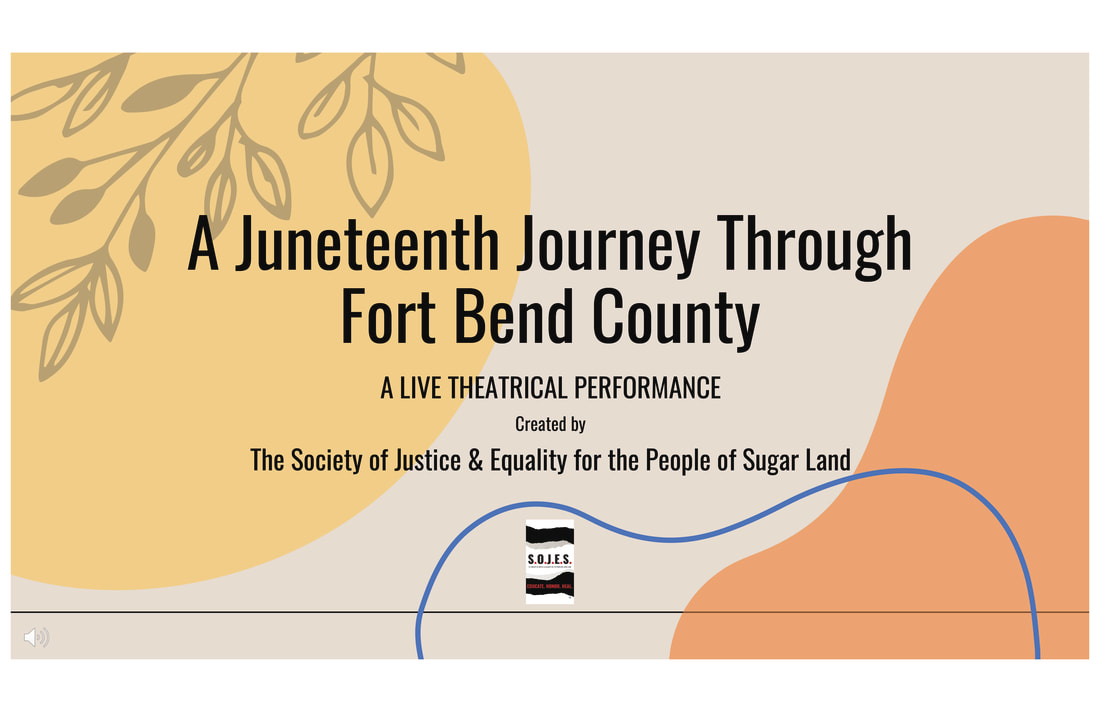
A live, theatrical performance about Fort Bend county's history - as told through the experiences of African Americans - is how the Society of Justice & Equality for the People of Sugar Land (S.O.J.E.S.) honored the importance and legacy of Juneteenth, the contributions of the Sugar Land 95, and the lives other significant African Americans and events in Fort Bend County's history.
"Our slogan at S.O.J.E.S. is EDUCATE. HONOR. HEAL. With this play, we stay true to that goal. And the audience will leave with a much clearer understanding of the plights and tribulations of African Americans in Fort Bend County's early years, the horrors of convict leasing, and why all these individuals are worthy of recognition and commendation. That's how we will honor Juneteenth."
The event was held Saturday, June 17, 2023, at the George Memorial Branch Library in Richmond, TX
"Our slogan at S.O.J.E.S. is EDUCATE. HONOR. HEAL. With this play, we stay true to that goal. And the audience will leave with a much clearer understanding of the plights and tribulations of African Americans in Fort Bend County's early years, the horrors of convict leasing, and why all these individuals are worthy of recognition and commendation. That's how we will honor Juneteenth."
The event was held Saturday, June 17, 2023, at the George Memorial Branch Library in Richmond, TX
FEBRUARY 18, 2023 - SUCCESSFULLY COMPLETED!
11 a.m. to 1 p.m., - Fort Bend University Library
The 95 at FIVE
S.O.J.E.S. commemorates the 5th anniversary of the discovery
of the Sugar Land 95
11 a.m. to 1 p.m., - Fort Bend University Library
The 95 at FIVE
S.O.J.E.S. commemorates the 5th anniversary of the discovery
of the Sugar Land 95
Educate. Honor. Heal.
The Society of Justice & Equality for the People of Sugar Land (S.O.J.E.S.) is committed to its mission of educating the community about convict leasing and honoring the contributions of African Americans in Sugar Land and Fort Bend County. It is time to learn and heal.
We invite the public to a commemoration of the 5th anniversary of the discovery of the "Sugar Land 95," the 95 victims of convict leasing whose remains were discovered in a Sugar Land high school construction site on February 19, 2018.
Our keynote speaker is Alex Lichtenstein, Ph.D., noted author on convict leasing and American Studies Chair at Indiana University, to speak about the impact of convict leasing in the south and in Sugar Land, Texas. Other speakers and honorees will be featured in the program.
This is a FREE event event, but donations are gladly accepted at: https://www.sojesjustice.org/donate.html
S.O.J.E.S. is working toward creating a TRAVELING EXHIBIT on CONVICT LEASING, including the Sugar Land 95. We look forward to your participation and support.
The Society of Justice & Equality for the People of Sugar Land (S.O.J.E.S.) is committed to its mission of educating the community about convict leasing and honoring the contributions of African Americans in Sugar Land and Fort Bend County. It is time to learn and heal.
We invite the public to a commemoration of the 5th anniversary of the discovery of the "Sugar Land 95," the 95 victims of convict leasing whose remains were discovered in a Sugar Land high school construction site on February 19, 2018.
Our keynote speaker is Alex Lichtenstein, Ph.D., noted author on convict leasing and American Studies Chair at Indiana University, to speak about the impact of convict leasing in the south and in Sugar Land, Texas. Other speakers and honorees will be featured in the program.
This is a FREE event event, but donations are gladly accepted at: https://www.sojesjustice.org/donate.html
S.O.J.E.S. is working toward creating a TRAVELING EXHIBIT on CONVICT LEASING, including the Sugar Land 95. We look forward to your participation and support.
June 2022
S.O.J.E.S. encourages citizens to help
"Lose the Loophole" in the U. S. Constitution
The 13th Amendment to the U.S. Constitution was supposed to end slavery in America.
It didn't.
While the amendment "officially" abolished slavery 1865, it STILL contains a loophole that allows people to be enslaved "as a punishment for crime whereof the party shall have been duly convicted." Being found guilty of such minor "offenses" as "not showing proper respect" or "joblessness" could mean years of involuntary servitude. It's the reason we have the Sugar Land 95.
Why?
Legal scholar and author Michelle Alexander writes: "After a brief period of progress during Reconstruction, African Americans found themselves, once again, virtually defenseless. The criminal justice system was strategically employed to force African Americans back into a system of extreme repression and control, a tactic that would continue to prove successful for generations to come.
"States put prisoners to work through a practice called “convict-leasing,” whereby white planters and industrialists “leased” prisoners to work for them. States and private businesses made money doing this, but prisoners didn’t. This meant many Black prisoners found themselves living and working on plantations against their will and for no pay decades after the Civil War," Alexander writes.
And according to History.com: "Scholars, activists and prisoners have linked that exception clause to the rise of a prison system that incarcerates Black people at more than five times the rate of white people, and profits off of their unpaid or underpaid labor.
This loophole has not gone anywhere... even after 157 years.
That's why S.O.J.E.S. is joining forces with legislators and groups seeking to eliminate this loophole.
"Lose the Loophole," a petition-signing and informational event, will be the centerpiece of S.O.J.E.S.'s observation of Juneteenth (Sunday, June 19) in 2022.
"We want to be a partner in the effort to end this unfair and unjust loophole, which is affecting lives of people even to this day," says Robin Cole, S.O.J.E.S. president. "The Sugar Land 95 were caught in this unfair exception clause. It's 2022. It's time for us to lose the loophole."
Oregon’s U.S. Senator Jeff Merkley and Congresswoman Nikema Williams (GA-05) have introduced the Abolition Amendment, which would strike the ‘Slavery Clause’ of the 13th Amendment that allows slavery to continue in the United States.
Plans for the Lose the Loophole event are underway. Please stay tuned for details.
PAST EVENTS
November 2021
Award-winning historian and author was keynote speaker at S.O.J.E.S.'s
A Day of Remembrance in February 2022
November 2021
Award-winning historian and author was keynote speaker at S.O.J.E.S.'s
A Day of Remembrance in February 2022
Matthew J. Mancini, Ph.D., author of the book One Dies, Get Another: Convict Leasing in the American South: 1866-1928, will be the keynote speaker at A Day of Remembrance, S.O.J.E.S.'s Black History Month community event commemorating the fourth anniversary of the discovery of the Sugar Land 95.
A Day of Remembrance will be held 11 a.m. to 1 pm., Saturday, February 19, 2022, at Fluor Corporation, 1 Fluor Daniel Drive, in Sugar Land, TX. The event is free and open to all.
"We are delighted to have professor Mancini share his extensive knowledge of convict leasing in the South and Sugar Land with our community," says Robin Cole, President of S.O.J.E.S. "And the fact that professor Mancini and others will join us during Black History Month and on the exact day four years ago that the world learned of the Sugar Land 95 is especially significant."
On February 19, 2018, the first of the remains of at least 95 victims of convict leasing in Sugar Land was uncovered by a backhoe operator helping to construct the James Reese Career and Technical Center, a Fort Bend Independent School District (FBISD) technical high school.
Since the discovery in 2018, a variety of efforts have begun to learn more about - and properly honor - the Sugar Land 95. These events include a news conference by S.O.J.E.S. and community leaders, a large Juneteenth Celebration by S.O.J.E.S. in 2021, and the recently announced plans to create an outdoor learning space and Sugar Land 95 cemetery enhancements by the FBISD (see story below).
Mancini's speech will focus on one of the most exploitative labor systems in America’s history. His book describes the seemingly uneven enforcement of convict leasing across state lines, which bound the South together for more than half a century in reliance on an institution of almost-unbelievable brutality.
In addition, Mancini's book describes the prisoners' daily existence, profiles the individuals - specifically, Edward Cunningham and Littleberry Ellis - who leased convicts, and also reveals both the inhumanity of the leasing laws and also the centrality of race relations in the establishment and perpetuation of convict leasing.
Mancini is Professor Emeritus of American Studies at Saint Louis University as well as department chair. He has worked as a Professor of History at Missouri State University and served as a Department head, and served as a Professor of American Studies at Eötvös Loránd University in Budapest, Hungary.
He also has served as a visiting professor at Rice University.
The recipient of several national teaching and scholarly awards, Mancini earned his Ph.D. from Emory University and an B.A. in English from Fordham University.
A Day of Remembrance will be held 11 a.m. to 1 pm., Saturday, February 19, 2022, at Fluor Corporation, 1 Fluor Daniel Drive, in Sugar Land, TX. The event is free and open to all.
"We are delighted to have professor Mancini share his extensive knowledge of convict leasing in the South and Sugar Land with our community," says Robin Cole, President of S.O.J.E.S. "And the fact that professor Mancini and others will join us during Black History Month and on the exact day four years ago that the world learned of the Sugar Land 95 is especially significant."
On February 19, 2018, the first of the remains of at least 95 victims of convict leasing in Sugar Land was uncovered by a backhoe operator helping to construct the James Reese Career and Technical Center, a Fort Bend Independent School District (FBISD) technical high school.
Since the discovery in 2018, a variety of efforts have begun to learn more about - and properly honor - the Sugar Land 95. These events include a news conference by S.O.J.E.S. and community leaders, a large Juneteenth Celebration by S.O.J.E.S. in 2021, and the recently announced plans to create an outdoor learning space and Sugar Land 95 cemetery enhancements by the FBISD (see story below).
Mancini's speech will focus on one of the most exploitative labor systems in America’s history. His book describes the seemingly uneven enforcement of convict leasing across state lines, which bound the South together for more than half a century in reliance on an institution of almost-unbelievable brutality.
In addition, Mancini's book describes the prisoners' daily existence, profiles the individuals - specifically, Edward Cunningham and Littleberry Ellis - who leased convicts, and also reveals both the inhumanity of the leasing laws and also the centrality of race relations in the establishment and perpetuation of convict leasing.
Mancini is Professor Emeritus of American Studies at Saint Louis University as well as department chair. He has worked as a Professor of History at Missouri State University and served as a Department head, and served as a Professor of American Studies at Eötvös Loránd University in Budapest, Hungary.
He also has served as a visiting professor at Rice University.
The recipient of several national teaching and scholarly awards, Mancini earned his Ph.D. from Emory University and an B.A. in English from Fordham University.
June 19, 2019
A Juneteenth Proclamation for Justice for the Sugar Land 95 was superb
A Juneteenth Proclamation for Justice for the Sugar Land 95 was superb
The Society of Justice and Equality for the People of Sugar Land - S.O.J.E.S. – honored the Sugar Land 95 in a moving ceremony designed to seek justice for the 95 African-Americans who died as part of state-sanctioned convict leasing.
The two-hour tribute – A Juneteenth Proclamation for Justice for the Sugar Land 95 – was held June 19, the first national observance of “Juneteenth.” Juneteenth marks the day in 1865 when Texas slaves learned they were officially freed two years after the signing of the Emancipation Proclamation.
Khambrel Marshall, KPRC-TV 2 meteorologist and host of Houston Newsmakers, served as the emcee to a standing-room only crowd of more than 250 attendees from across Fort Bend County and Houston.
S.O.J.E.S.’s included speeches from elected officials, community leaders, organizations, educators and supporters, as well as Marilyn Moore, wife of the late Reginald Moore, the former Texas Department of Criminal Justice (TDCJ) guard and long-time historian and community activist who sought to tell the truth about convict leasing in Sugar Land.
Robin Cole, president of S.O.J.E.S., announced plans to build a national convict leasing museum in Sugar Land to educate the world about the harrowing system of racial oppression that existed in Texas and throughout the South from the late 1800s to the early 1900s.
“The time has come to get justice for the Sugar Land 95, their unimaginable lives of forced labor, and explain why people should never again be subjected to such inhumane and cruel practices that benefitted only a few,” says Cole, a Sugar Land resident.
Together with S.O.J.E.S.’s board, which includes Fort Bend County and/or Sugar Land residents Anna Lykoudis-Zafiris, Paul Matthews, Debra McGaughey, Bruce Lemmie, Farha Ahmed and Pastor David Sincere, S.O.J.E.S. remains committed to its mission of seeking justice for the Sugar Land 95.
Together, we can be the Voice for the Voiceless.
The two-hour tribute – A Juneteenth Proclamation for Justice for the Sugar Land 95 – was held June 19, the first national observance of “Juneteenth.” Juneteenth marks the day in 1865 when Texas slaves learned they were officially freed two years after the signing of the Emancipation Proclamation.
Khambrel Marshall, KPRC-TV 2 meteorologist and host of Houston Newsmakers, served as the emcee to a standing-room only crowd of more than 250 attendees from across Fort Bend County and Houston.
S.O.J.E.S.’s included speeches from elected officials, community leaders, organizations, educators and supporters, as well as Marilyn Moore, wife of the late Reginald Moore, the former Texas Department of Criminal Justice (TDCJ) guard and long-time historian and community activist who sought to tell the truth about convict leasing in Sugar Land.
Robin Cole, president of S.O.J.E.S., announced plans to build a national convict leasing museum in Sugar Land to educate the world about the harrowing system of racial oppression that existed in Texas and throughout the South from the late 1800s to the early 1900s.
“The time has come to get justice for the Sugar Land 95, their unimaginable lives of forced labor, and explain why people should never again be subjected to such inhumane and cruel practices that benefitted only a few,” says Cole, a Sugar Land resident.
Together with S.O.J.E.S.’s board, which includes Fort Bend County and/or Sugar Land residents Anna Lykoudis-Zafiris, Paul Matthews, Debra McGaughey, Bruce Lemmie, Farha Ahmed and Pastor David Sincere, S.O.J.E.S. remains committed to its mission of seeking justice for the Sugar Land 95.
Together, we can be the Voice for the Voiceless.
Proudly powered by Weebly
